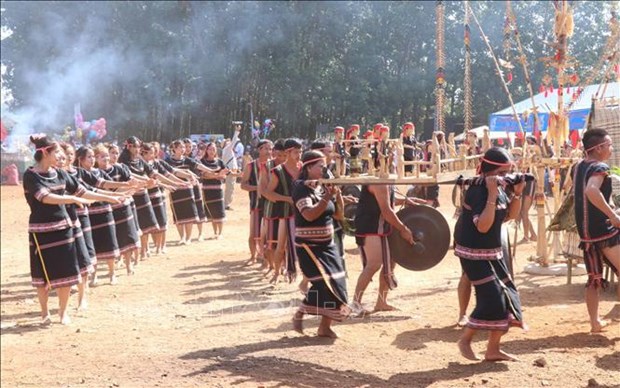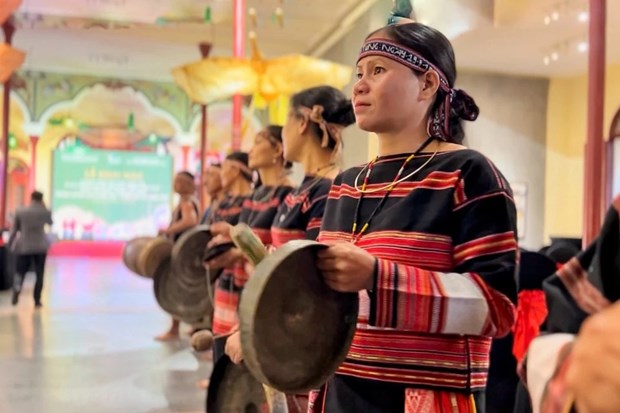Central Highlands holds great potential for cultural tourism
The Central Highlands boasts a diverse culture which is enriched by ethnic minority groups from many parts of the country, thus the region has huge potential for cultural tourism development.
Hanoi (VNA) – The Central Highlands boasts a diverse culture which is enriched by ethnic minority groups from many parts of the country, thus the region has huge potential for cultural tourism development.
According to Prof. Dr. Trinh Quang Phu, Director of the Oriental Development Research Institute, the Central Highlands retains many tangible and intangible cultural heritages which have both historical and unique aesthetic values. These precious intangibles include Nha Rong (communal house), Nha Dai (long house), dan da or lithophone (a stone musical instrument played by ethnic minority groups in the Central Highlands of Vietnam), festivals and folk literature treasures with epic and folk songs, passed down through many generations.
One of the famous heritages is the space of gong culture in the Central Highlands, which has been recognised by the United Nations Educational, Scientific and Cultural Organisation (UNESCO) as an intangible cultural heritage of humanity.
Gongs are used in many important rituals and creeds. They are considered a privileged language between men, divinities and the supernatural world. Central Highlands gongs not only have a special attraction in the diversity and distinctiveness of performing techniques, but also symbolise the life of indigenous ethnic communities. Every family possesses at least one gong, which indicates its wealth, power and prestige.
In the past, gongs were only played during festivals, calling on people to gather around fire, drink wine, dance and sing together.
Currently, the Central Highlands Gong Festival is held annually, with Kon Tum, Gia Lai, Dak Lak, Dak Nong, and Lam Dong provinces taking turn to host.
The Central Highlands culture is closely linked to villages and features unique festivals in the vast forest space. Traditional festivals in the Central Highlands reflect concepts about people, attracting the participation of the entire community such as the new rice ceremony and wedding ceremony for young people and celebration of longevity for the elderly.
The population of the Central Highlands rose from more than 1.2 million people with 18 ethnic groups in 1976 to 6 million with 54 ethnic groups, including 36 ethnic minorities, mainly from the northern mountainous region. The ethnic groups who came to settle here brought with them the cultural heritage of their homeland, enriching the cultural treasure of the Central Highlands ethnic groups.
The Muong in Hoa Binh was the first group to come to Dak Lak. Currently, over 1,000 Muong households reside mainly in Hoa Thang commune in Buon Ma Thuot city. The Muong people also have gong culture like the Ede, Ba Na, and Gia Rai. During festivals, Muong women in Hoa Thang commune gather to play gongs and pass on their ethnic group's ancient gong songs to each other.
The Tay and Nung people live mainly in the districts of Ea H'leo, Cu M'gar, Krong Bong, and Buon Ho township of Dak Lak province. They still retain a number of ethnic festivals such as long tong (going to the field festival) - a unique agricultural festival of the Tay ethnic group, Sinh Minh and Hang Po festivals.
In Dak Lak, a number of festivals have been maintained regularly in January, such as the Viet Bac Folk Culture Festival of the Tay people in Krong Nang district, Hang Po festival of the Nung people in Buon Ho township, the Khai Ha (going to the field) festival of Muong people and the spring festival of Thai people in Buon Ma Thuot city.
According to a study on sustainable cultural tourism development in the Central Highlands, it is necessary to develop tourism based on natural resources and diversity in ethnic cultural identities, given the current conditions of the region. One of the cultural values of the Central Highlands that needs to be prioritised is to tap festivals.
Festivals in the region are diverse and unique. If the cultural tourism potential is well exploited, the number of tourists coming to the Central Highlands will surge remarkably compared to that of 2023. Last year, Lam Dong province welcomed 8.6 million visitors while Dak Lak, Kon Tum, Gia Lai and Dak Nong received more than 1.16 million, 1.3 million, 1.15 million and nearly 700,000, respectively./.










